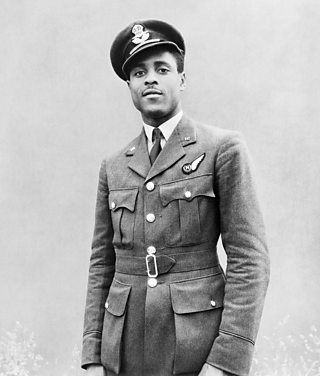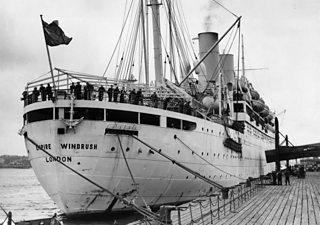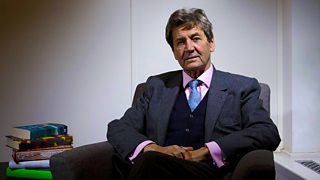Celebrated pilot, navigator and prisoner of war: the incredible story of one of Britain鈥檚 first black airmen, Johnny Smythe
In the 91热爆 Radio 4 podcast History’s Secret Heroes, Helena Bonham Carter shines a light on the extraordinary stories of some of the most fascinating unsung heroes of the Second World War.
Johnny Smythe was one of the first West African airmen to join the Royal Air Force – leaving Sierra Leone behind and swiftly becoming a highly skilled navigator for a World War II bomber. Smythe’s crew considered him a lucky charm, but as he faced a series of terrifying flights would his good fortune finally run out?
He was eager to serve
When the Second World War broke out, Johnny Smythe was 25 years old and working in an office in Freetown, in British Sierra Leone. When he spotted posters recruiting for the local defence force, he jumped at the chance, quickly rising to the rank of sergeant.
He was absolutely frozen. He鈥檇 never worn a coat or a woollen jumper before... and this was Scotland in the winter.
Then, when the British government lifted the colour bar, and began to recruit from the colonies, Johnny was among thousands of black Africans who applied to join the Royal Air Force. Smythe was an exceptionally qualified candidate: “He was very tall, very fit… He was very charismatic,” explains Smythe’s son, Eddy.
Only five men from Sierra Leone were initially selected; Johnny Smythe was one of them.
“He’d never worn a coat”
In November 1941, Smythe and his four compatriots arrived in Scotland. “They were young. It was an adventure. It was glamorous,” says Eddy. But as he walked off the boat, Smythe got his first shock: “He was absolutely frozen. He’d never worn a coat or a woollen jumper before because he’d never needed to, and this was Scotland in the winter.”
From there, the recruits went to London. They learned to march on Lord’s Cricket Ground. They studied hard: maths, aircraft recognition, signalling. Smythe excelled in his training and was selected to be a pilot. “He would fly Tiger Moths and was actually flying solo,” states Eddy.
Then, after just a few training flights, the RAF would send Smythe in an unexpected and dangerous direction.
From pilot to navigator
Every bombing crew needed a navigator. It required complex skills – which Smythe was deemed to have in abundance. But it was an extremely perilous job.

“They only flew at night as the RAF bombed at night,” Eddy states. “These planes were unpressurised; they were very cold. Above 15,000 feet you needed oxygen. They had to deal with ice and snow and fog. And there were mishaps: some people never found the target.”
On his first training flight, Smythe plotted the course with incredible accuracy, found the target and got back. The crew celebrated. “They partied as hard as they could, they drank as much as they could, because they actually believed that they weren’t going to survive.”
“His colleagues believed that having a black person on the plane was good luck”
Weeks later, Smythe and the crew set out on their first operational mission, to parachute mines into French waterways to slow the German advance. They would have to fly low, which made them an easy target. “My father was very nervous,” says Eddy, “because the planes were being shot down with such regularity.”
The mission was a success. “A lot of his colleagues actually believed that having a black person on the plane was good luck.” They were superstitious and Smythe played up to this. “It was good banter between them but I suspect deep down there was that tiny bit of hope: we’ve got this special mascot on board.”
An unexpected promotion
Everyone recognised the navigator’s extreme skill.
He was promoted to Flight Officer Johnny Smythe. “It was a long way to come from being a young lad in Freetown Sierra Leone,” recognises Eddy. He was the only black person in his camp and he was one of just four officers.
Smythe’s luck was about to run out
On 18 November 1943, Smythe took the navigator’s seat for his fifth mission. The crew flew with hundreds of other bombers, deep into Germany. But as they neared Berlin, a shell exploded beneath the plane. “My father was hit by shrapnel, in the thigh,” says Eddy. “Another piece went into his abdomen… straight through the front and out the back, just missing his lungs.”
Smythe managed to drop the bombs, but a German fighter was closing in and they’d lost an engine. The only option was to bail out.
“He landed in a snow-covered field in the middle of nowhere. He took off his parachute and hid in some bushes,” Eddy recounts. Dosed with morphine, he stole a bicycle, but after cycling for a few miles he crawled into a barn and drifted off. He woke to the sound of German voices, shouting. “A bullet was fired into the barn so he knew that the game was up.”
Smythe walked out with his hands up. “There was a look of shock on the faces of these Germans, to see this six-foot-four black man in an RAF officer’s uniform.”
He spent two years in a notorious prison camp
“He was roughed up, beaten badly,” says Smythe’s son. Then he was taken to Stalag Luft I, where 9,000 allied officers were detained. Surrounded by barbed wire and patrolled by armed guards, there was no escape.

After two long, bitter years in the camp, Smythe woke on 1 May 1945 to an eerie silence. The guards in the towers were gone; the main gates were wide open. The war was over.
From the war to the Empire Windrush
Smythe returned to Britain and remained in the RAF. He worked for the colonial office, helping demobbed Caribbean soldiers, and was a senior officer on the Empire Windrush. After leaving the forces he trained as a barrister, becoming a Queen’s Counsel. Then he returned to Sierra Leone where he rose to national prominence as the country’s Attorney General.
Decades after the war, Smythe attended a cocktail party at the British Ambassador’s residence in Freetown. He met the German Ambassador, who asked Smythe how his war had ended. Smythe explained how he’d been shot down and “this ambassador’s face just went pale,” says Eddy. The German had been a fighter pilot, and had brought down a bomber that day, in that very vicinity.
Eddy asked his father if he felt angry or vengeful in that moment. “No,” Johnny replied. “We actually threw our arms round each other and we drank and we toasted the fact that we’re here today.”
More absorbing listening on Radio 4
-
![]()
History's Secret Heroes
Helena Bonham Carter shines light on extraordinary stories from World War Two.
-
![]()
In Our Time
Fascinating, in-depth and illuminating discussions about... just about anything which is of interest in human history to the present day.
-
![]()
You're Dead to Me: Mozart Special
In this special live episode, Greg Jenner is joined by Dr Hannah Templeton and comedian David O鈥橠oherty in 18th-century Europe to learn all about Wolfgang Amadeus Mozart.
-
![]()
Life Changing
Dr Sian Williams talks to people who have lived through extraordinary events that have reshaped their lives in the most unpredictable ways.





